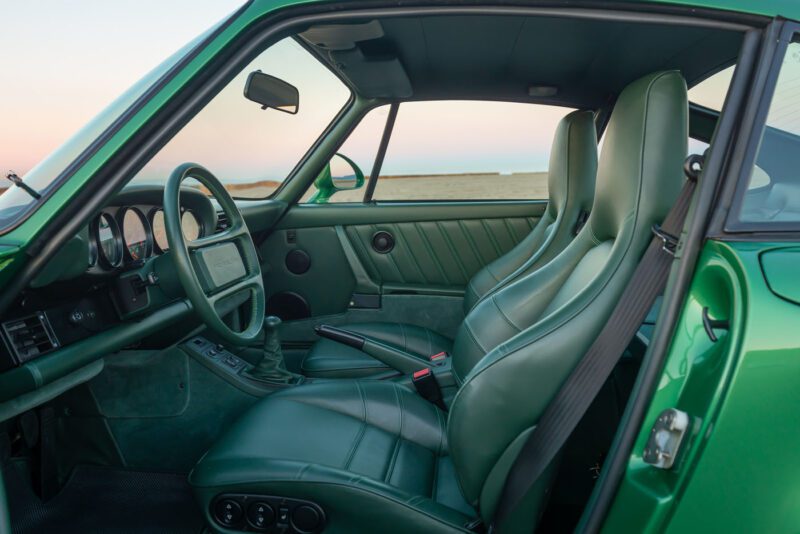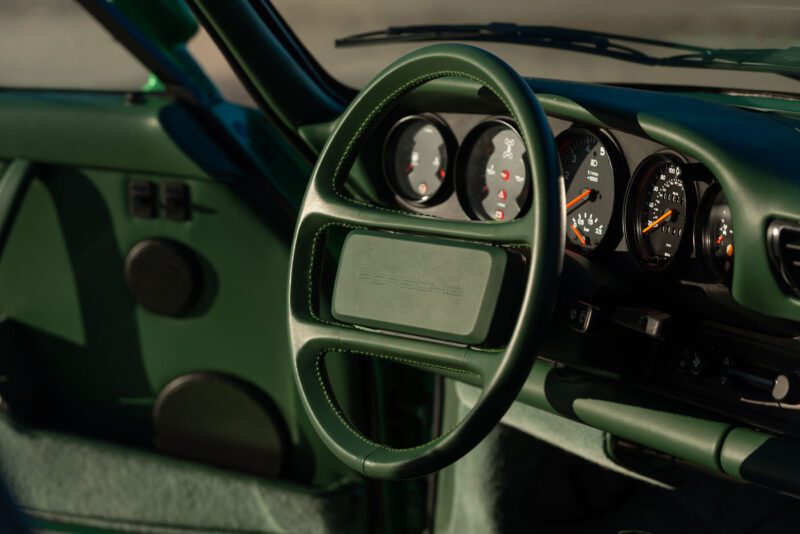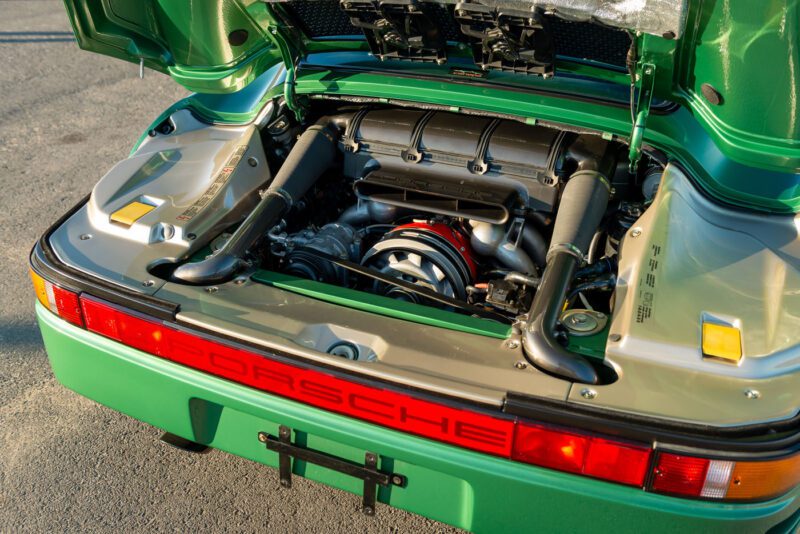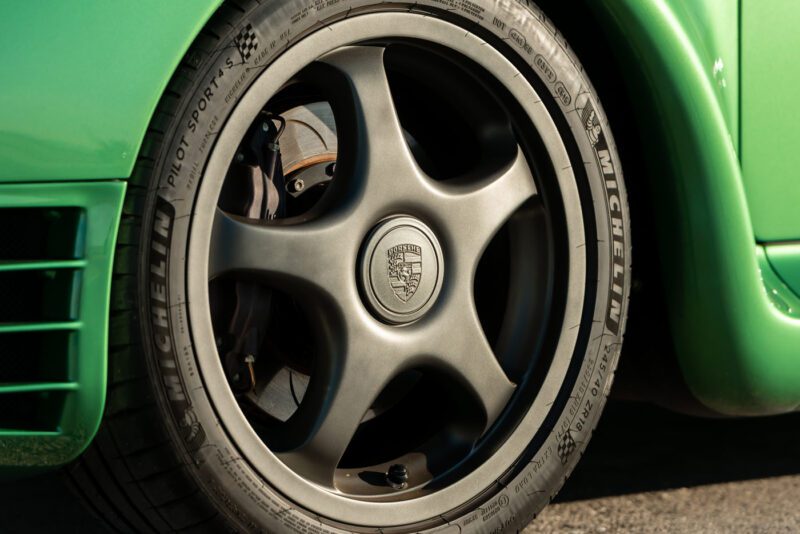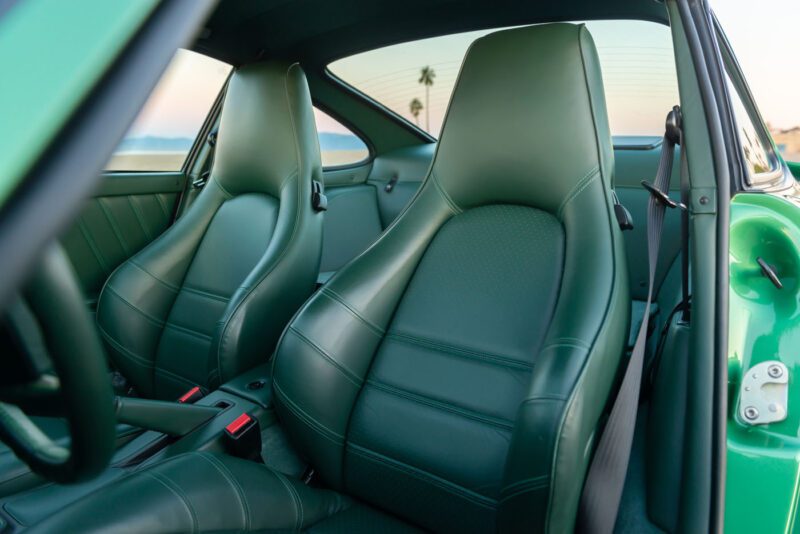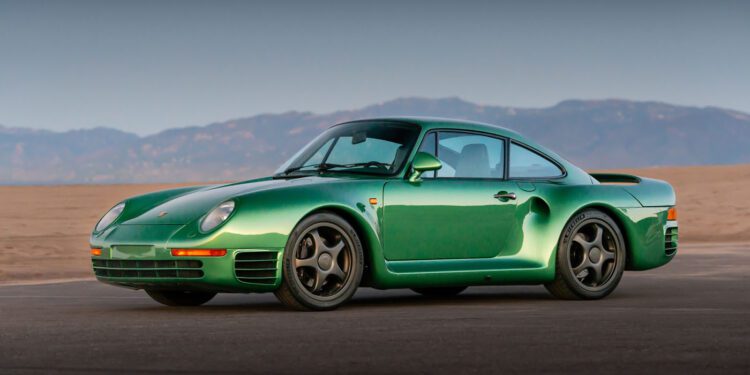Presented by RM Sotheby’s.
It is hard to overstate just how truly ahead of its time the Porsche 959 project was when it was unveiled as the Gruppe B concept at the Frankfurt auto show in 1983 and subsequently as a production example in 1985. It unequivocally defined the supercar market at its very highest end—where there are no compromises on performance or limitations on cost. Alongside Lamborghini’s Countach LP5000 QV and Ferrari’s F40, the 959 has become a “poster car” for an entire generation of automotive enthusiasts. Better yet, the 959 has always been the most luxurious, reliable, tractable, and rarest model of these three.
While Ferrari and Lamborghini were jousting for the relatively simple accolade of having the World’s Fastest Car, Helmuth Bott’s team of engineers at Porsche were given free reign to pursue an enviably open-ended brief: To create the world’s most advanced—and capable—supercar.
In every department, Porsche engineers utilized cutting-edge technologies, no matter the cost, to unlock hitherto unparalleled levels of performance. It was Bott’s dedication to the ethos that electronics could enhance mechanical performance that made the end result so spectacular. Looking past its incredible performance figures, the 959 introduced a number of features that would become industry standards in the future. Adjustable suspension, an intelligent four-wheel-drive system, lightweight Kevlar composite and aluminum body panels, and super-lightweight hollow-spoke magnesium wheels made it nothing short of a game-changer.
The 959 was light-years ahead of its time, and its staggering performance capabilities were eclipsed only by its development costs—which nearly bankrupted Porsche. Despite an MSRP of 420,000DM (~$300,000), the company still lost 50% of its costs on each of the 292 units sold. Thankfully, Porsche survived. But, time marches onward¬– ever threatening the mystique of the technological tour de force that is the 959; at least, that is, a normal 959.
The car offered here is anything but normal.
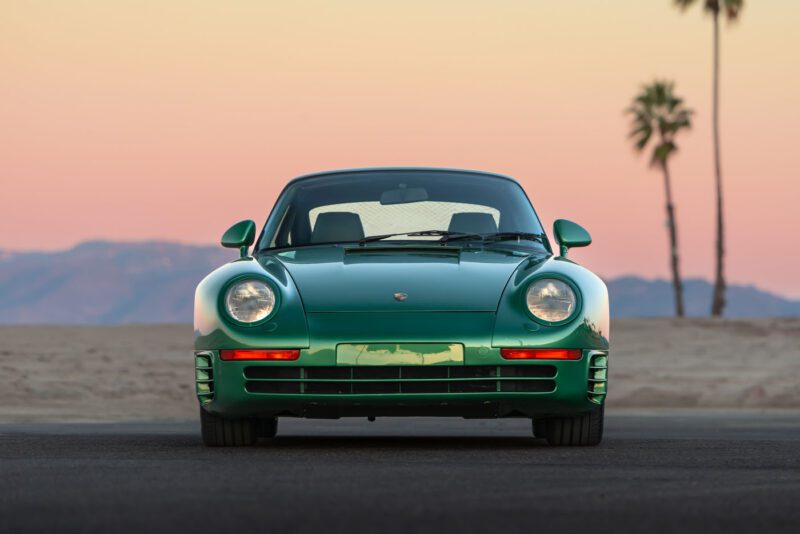
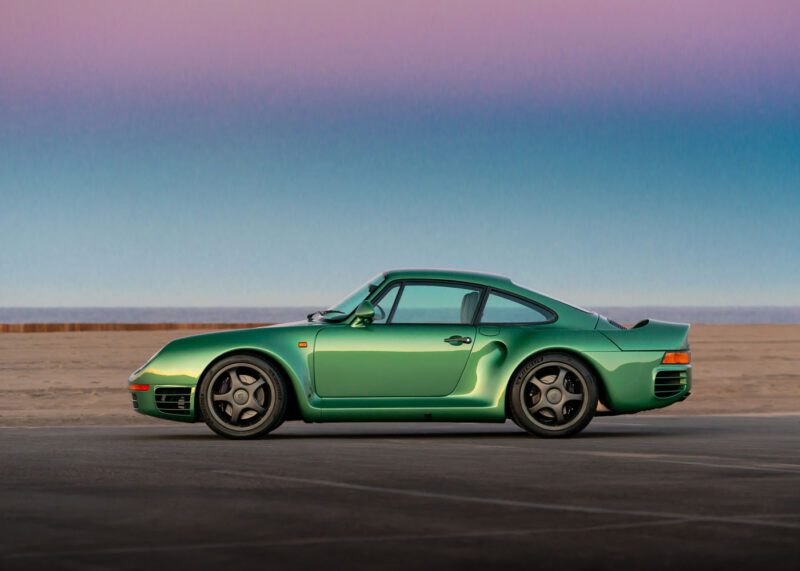
THE 959 SC REIMAGINED BY CANEPA
Bruce Canepa is undoubtedly among the world’s most legendary Porsche specialists. His company’s familiarity with the 959 is unmatched within North America, and he was personally fortunate to be one of those lucky enough to have experienced a Porsche 959 in 1987.
Hearing of his expertise, Microsoft co-founder Paul Allen purchased a 959 from Canepa in 1987; shortly afterward, having experienced Allen’s car, Bill Gates acquired one via Canepa as well. The 959 was not originally available for the US market, but Canepa was famously instrumental in the passing of the “Show or Display” exemption rule, the federal legislation that allowed these highly sought-after vehicles to be driven in the US for the first time in 1999. The first challenge was to meet federal and state emissions standards, ultimately creating a 580-horsepower, emissions-legal engine with Canepa’s “Gen 1” upgrade.
Continued driving experiences with the model over the next 20 years led Bruce to evaluate and determine every aspect of the 959 design that could be improved. These observations were turned into two decades of continuous research and development, thousands of real-world miles driven, and many stages of refining product prototypes. Canepa resultingly unveiled a series of performance upgrades for fitment to any standard Porsche 959. Another two generations of successive upgrades were surpassed with the debut of Canepa’s 959 SC program in 2015, which endeavored to entirely recommission and reengineer the model to outperform anything that could have been offered by the Porsche factory.

Whereas the original 959 left the factory with 444 horsepower from its 2.85-liter sequential-turbo flat-six, the 959 SC Reimagined by Canepa uses upgraded BorgWarner turbos (with internal wastegate) in a parallel twin-turbo system and new engine management based around MoTec hardware to nearly double that figure to 825 horsepower and 600 pound-feet of torque.
Standard 959 engine internals are replaced, including forged pistons and Pankl titanium connecting rods. The camshafts have been revised to offer improved low-end torque and mid-range power, and the valvetrain has been entirely redesigned for better responses. The original ignition distributor is substituted in favor of individual coil packs, while completely revised intake systems, equal-length exhaust headers coated in tungsten ceramic, and a two-stage exhaust system made from stainless steel and titanium give the new engine the bark required to match its bite.
As for the suspension, by upgrading the original 959 Sport coilover system with custom valved shocks from Penske and titanium coilover springs, the 959 SC customer is treated to greatly improved handling—at all speeds—along with great ride quality on all types of road surfaces. Further, Canepa produced new cast-magnesium 18-inch hollow-spoke wheels utilizing modern technology while still staying true to Porsche’s original 959 design.
Four-thousand-plus hours are put into each build, and over 3,000 individual pieces are restored, rebuilt, or upgraded. Nothing is left unchecked or untouched on every 959 that Canepa reimagines; they are completely disassembled, and entirely rebuilt as better-than-new machines. Color combinations and final touches are tailormade to each client’s specification in close collaboration with Bruce Canepa; those lucky enough to garner a 959 SC order slot can choose from over 200 Porsche and paint-to-sample colors. Each example is one-of-one, with production set at just 50 examples in total.
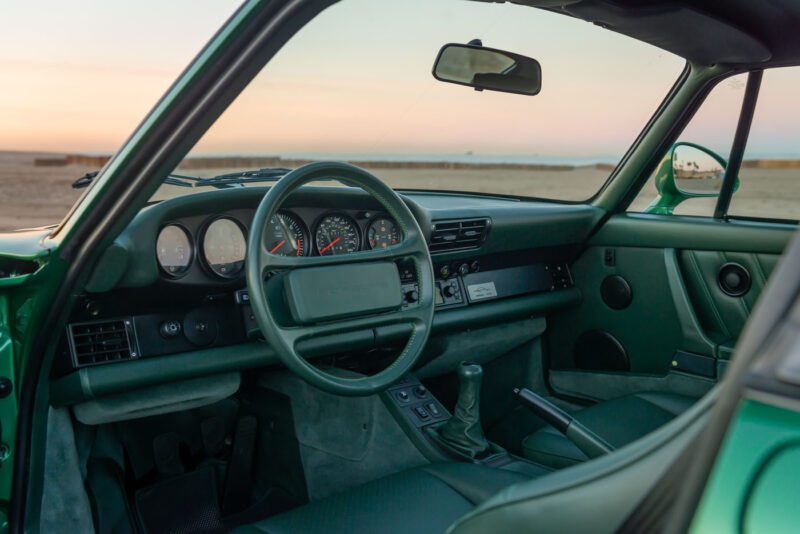
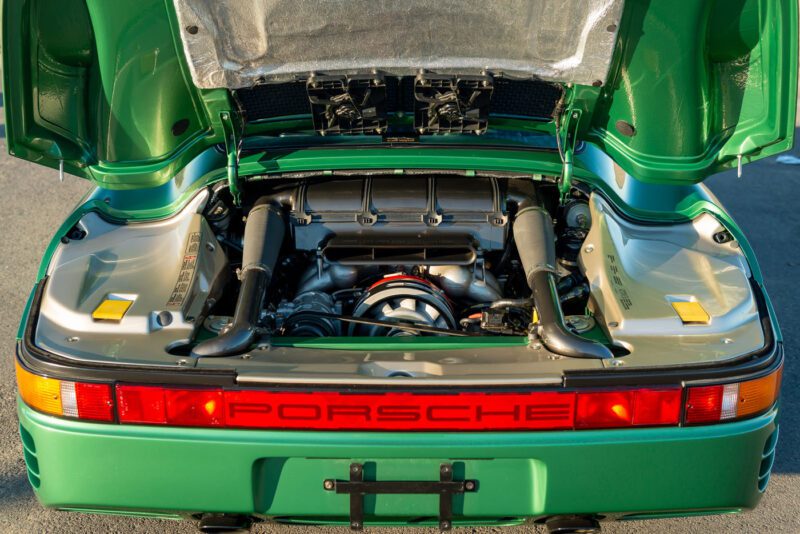
959 SC 003
This 1988 Porsche 959 began its life as one of the 207 “Komfort” models produced. Originally finished in Silver Metallic over standard grey leather, it was delivered new to Monte Carlo. Having subsequently been sold to Japan and displayed within a private museum in Tokyo, it remained there until it was imported to the United States in September 2016.
A highly original example then showing fewer than 38,180 kilometers (~23,750 miles), it was discreetly offered to one of Canepa’s clients as “003”, and then completely disassembled to begin its comprehensive transformation.
Now clad in a marvelous shade of paint-to-sample Emerald Green (the sole 959 SC that will be painted in this color) over a plush Dark Green leather cabin, 003 is equal parts visual masterpiece and mechanical marvel. The set of 18-inch wheels are presented in a Canepa proprietary graphite finish that mirrors the look of oxidized magnesium, a handsome and subtle nod to the Porsche race cars which the original client uses to contest several professional racing series. Of course, everything about the 959 SC is designed to look the part of factory work, and the revisions would largely appear to be OEM to all but the most discerning, well-informed Porsche enthusiast.
Not including exhibitions while under Canepa’s care, 003 has been very well received by the Porsche community at several major events including Luftgekühlt 4 in 2017, Rennsport Reunion VI in 2018, and the 2022 Velocity Invitational. Serviced as-needed, approximately 18 months ago the car benefitted from a stated $172,000 in upgrades to bring it up to the most current 959 SC specification.
Put simply, the Porsche 959 is amazing. Any collection would be immensely privileged to count an example of the legendary model among its ranks. The performance, technology, aesthetics, comfort—all of it combines to create an exceptionally outstanding vehicle of great and original importance.
But the Porsche 959 SC Reimagined by Canepa is—thanks to many years of product development and 4,000 hours of recommissioning— even better than the original.
This vehicle will be offered at RM Sotheby’s Miami sale, taking place 10 December. View more and register to bid online at rmsothebys.com today.
